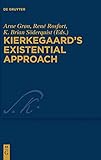Kierkegaard's Existential Approach / ed. by Arne Grøn, René Rosfort, K. Brian Söderquist.
Material type: TextSeries: Kierkegaard Studies. Monograph Series ; 35Publisher: Berlin ; Boston : De Gruyter, [2017]Copyright date: ©2017Description: 1 online resource (VI, 286 p.)Content type:
TextSeries: Kierkegaard Studies. Monograph Series ; 35Publisher: Berlin ; Boston : De Gruyter, [2017]Copyright date: ©2017Description: 1 online resource (VI, 286 p.)Content type: - 9783110478662
- 9783110491012
- 9783110493016
- 100
- B4377 .K5123 2017eb
- online - DeGruyter
- Issued also in print.
| Item type | Current library | Call number | URL | Status | Notes | Barcode | |
|---|---|---|---|---|---|---|---|
 eBook
eBook
|
Biblioteca "Angelicum" Pont. Univ. S.Tommaso d'Aquino Nuvola online | online - DeGruyter (Browse shelf(Opens below)) | Online access | Not for loan (Accesso limitato) | Accesso per gli utenti autorizzati / Access for authorized users | (dgr)9783110493016 |
Frontmatter -- Table of Contents -- Foreword -- Acknowledgements -- Reception -- Philosophy of Existence in France in the 1930s -- “Thinker without Category” -- Existential Hermeneutics -- Concepts -- The Concept of Existence -- Thinking of Existence -- How to be a Human Being in the World -- Disclosing Despair: The Role of the Pseudonyms in Kierkegaard’s Existential Approach -- Father Kierkegaard -- Anxiety as the Origin of Freedom and Responsibility -- Concrete Infinity -- Issues -- The Danger of Losing Oneself -- What Was I Thinking? -- Kierkegaard’s Dual Individual: Reconciling Selfhood in the Existentialist and Analytic Traditions -- List of Contributors -- Index
restricted access online access with authorization star
http://purl.org/coar/access_right/c_16ec
Recently there has been a growing interest not only in existentialism, but also in existential questions, as well as key figures in existential thinking. Yet despite this renewed interest, a systematic reconsideration of Kierkegaard’s existential approach is missing. This anthology is the first in a series of three that will attempt to fill this lacuna. The 13 chapters of the first anthology deal with various aspects of Kierkegaard's existential approach. Its reception will be examined in the works of influential philsophers such as Heidegger, Gadamer, and Habermas, as well as in lesser known philosophers from the interwar period, such as Jean Wahl, Lev Shestov, and Benjamin Fondane. Other chapters reconsider central notions, such as "anxiety", "existence", "imagination", and "despair". Finally, some chapters deal with Kierkegaard's relevance for central issues in contemporary philosophy, including "naturalism", "self-constitution", and "bioethics". This book is of relevance not only to researchers working in Kierkegaard Studies, but to anyone with an interest in existentialism and existential thinking.
Issued also in print.
Mode of access: Internet via World Wide Web.
In English.
Description based on online resource; title from PDF title page (publisher's Web site, viewed 28. Feb 2023)


